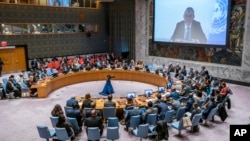The head of the U.N. agency that assists Palestinians said Monday that civilians in the Gaza Strip are suffering collective punishment and forced displacement as Israel prosecutes its war against Hamas.
“An immediate humanitarian cease-fire has become a matter of life and death for millions,” UNRWA Commissioner-General Philippe Lazzarini told an emergency meeting of the U.N. Security Council on the situation. “The present and future of Palestinians and Israelis depend on it.”
Collective punishment and forced displacement can rise to crimes against humanity and war crimes.
Lazzarini told the Council in a video briefing from the Jordanian capital, Amman, that he was shocked both by the horrific Oct. 7 attack Hamas carried out on Israel and the relentless bombing by Israeli forces on Gaza that have followed.
“The level of destruction is unprecedented; the human tragedy unfolding under our watch is unbearable,” he said.
He called for “strict adherence” to international humanitarian law; the safe, unimpeded and continuous flow of aid and fuel into Gaza; and more funding for UNRWA’s work.
Attack, blockade
Israel put the Hamas-controlled Gaza Strip under a complete blockade following the terror attack that killed 1,400 Israelis. After two weeks of international negotiations, limited relief supplies of food, water and medicines started entering Gaza on Oct. 21, but it has been slow, sporadic and insufficient to meet the rising needs.
The U.N. says that 33 aid trucks entered Gaza through Egypt’s Rafah border crossing on Sunday — the largest number to cross in a single day so far – and around 115 overall in the past week.
“Let me be clear – the handful of convoys being allowed through Rafah is nothing compared to the needs of over 2 million people trapped in Gaza,” the UNRWA chief said.
The growing desperation was evident on Sunday, when panicked Gazans looted several UNRWA warehouses.
The agency has about 13,000 Palestinian staff in Gaza, who continue to work. Lazzarini confirmed 64 have been killed and 22 injured in the past three weeks.
“The last tragic passing was two hours ago,” he told the Council. “Samir, head of security and safety in the middle region, died with his wife and eight children.”
He said this is the highest number of U.N. aid workers killed in a conflict in such a short period.
Children are also falling victim to the violence in shocking numbers.
The head of the U.N. children’s agency, quoting figures from the Palestinian Ministry of Health, said more than 3,400 children have been killed in Gaza and more than 6,300 injured. The numbers could not be independently verified.
“This means that more than 420 children are being killed or injured in Gaza every day – a number which should shake each of us to our core,” UNICEF Executive Director Catherine Russell told Council members.
She also condemned the killing of at least 37 children in the West Bank and more than 30 Israeli children killed in the Oct. 7 attack, while at least 20 others remain hostages of Hamas with their fates unknown.
Calls for humanitarian cease-fire
The U.N. Security Council has been unable to overcome its own divisions to adopt a resolution calling for a humanitarian cease-fire or pause. So on Friday, the U.N. General Assembly took up the issue and voted overwhelmingly for a humanitarian truce. But its resolutions are not legally binding and Israel has said it will not stop fighting Hamas.
“Calling for an immediate cease-fire is ultimately asking to tie Israel’s hands and keep Hamas’ rule in Gaza,” Israeli Ambassador Gilad Erdan told the council. “Is this the future that you want for the people of Gaza?”
But calls grew in the Council for a halt to the fighting, especially to save the lives of children and assist civilians.
The United Arab Emirates and China called for Monday’s meeting.
“Children do deserve our special protection and are entitled to it today,” Ambassador Lana Nusseibeh said, adding the children surely are not part of Hamas.
“Will we help them?” she asked.
She urged the Council not to ignore the will of the General Assembly.
China’s ambassador said the General Assembly had pointed the Security Council in the right direction.
“In the face of the current critical situation, China once again solemnly calls on the Council to strengthen unity, build consensus and take responsible and meaningful action as soon as possible,” Ambassador Zhang Jun said.
“The price of inaction is unacceptably high,” said Brazil’s Foreign Minister Mauro Vieira, who chaired the meeting as council president this month. “The growing urgency for the families of the hostages and the unbearable pain for the civilian population of Gaza cannot be understated.”
Washington’s envoy said the humanitarian crisis in Gaza is growing more dire each day, and the U.S. is working with Israel, Egypt and the United Nations to make sure continued aid quickly reaches those who need it.
“Food, fuel, water, medicine and other essential services must be restored,” Ambassador Linda Thomas-Greenfield said. “And while the number of trucks entering Gaza continues to increase, it is not nearly enough. The amount of humanitarian assistance flowing into Gaza must be scaled up – urgently. We must do everything possible to save lives.”
But Washington remains opposed to a humanitarian cease-fire, saying it would benefit Hamas.
“What we have said should be considered and explored are temporary localized humanitarian pauses to allow aid to get to specific populations and maybe even to help with evacuation of people that want to get out, move more to the south,” White House National Security Council Coordinator John Kirby told reporters in Washington. “We do support that. We do not support a cease-fire at this time.”






